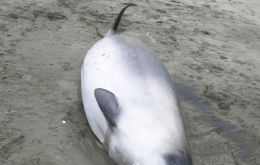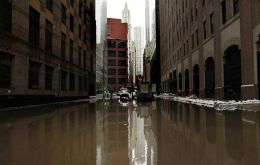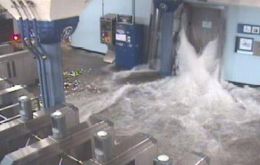MercoPress. South Atlantic News Agency
Environment
-
Thursday, November 8th 2012 - 07:02 UTC
Powerful 7.4-magnitude quake hits Guatemala kills dozens; tremors reach Mexico City

A powerful earthquake off the Pacific coast of Guatemala on Wednesday sent debris crashing down onto cars, collapsed roads and killed dozens in the Central American nation, officials said.
-
Thursday, November 8th 2012 - 06:58 UTC
Argentine Judge orders Chevron assets seizure related to court case in Ecuador

An Argentine judge has embargoed up to 19 billion dollars in Chevron assets in connection with an environmental lawsuit by Ecuadorean villagers, a lawyer for the plaintiffs said on Wednesday.
-
Tuesday, November 6th 2012 - 20:56 UTC
NZ scientists in world first discovery of the elusive spade-toothed beaked whale

New Zealand scientists have made a world first discovery when they identified two skeletons belonging to the spade-toothed beaked whale, which is so rare that nobody has seen one alive. A 17-foot whale mother and her calf beached themselves in New Zealand in 2010 and were buried misidentified for a much more common type of whale that occasionally strands on NZ beaches.
-
Sunday, November 4th 2012 - 06:31 UTC
Peru slashes anchovy quota by 68%; fish meal prices forecasted to soar

Peru slashed its commercial fishing quota as warmer water temperatures and controversial practices deplete stocks of anchovy in one of the world’s richest fisheries. The government cut its quota for this summer’s anchovy season by 68% to 810.000 tons, the smallest allowance in 25 years.
-
Friday, November 2nd 2012 - 23:12 UTC
UK confirms BAS first-class scientific research and Antarctica strategic presence

Plans to merge the British Antarctic Survey (closely linked to the Falkland Islands) and the National Oceanography Centre (NOC) have been ruled out, Science minister David Willetts announced. In a written statement he said the Natural Environment Research Council (NERC) had decided not to proceed with the proposal.
-
Friday, November 2nd 2012 - 08:36 UTC
CCAMLR fails to reach agreement on new marine protected areas in Antarctica

Governments meeting in Australia have failed to reach agreement on new marine protected areas for the Antarctic Ocean. A decision has been deferred until July 2013 when all the relevant science will be considered.
-
Friday, November 2nd 2012 - 00:02 UTC
Republican New York Mayor endorses Obama for his record on climate change

New York Mayor Michael Bloomberg endorsed President Barack Obama for a second term, citing the importance of his record on climate change, particularly in the aftermath of the devastating blow dealt to the New York area by storm Sandy.
-
Thursday, November 1st 2012 - 06:40 UTC
Wall Street returned to life with average trading volume; most buildings in the area with no power

The US stock market slowly returned to life on Wednesday after two days in the dark, in the wake of the massive storm Sandy that caused the market's first weather-related two-day closure since the late 19th century.
-
Wednesday, October 31st 2012 - 05:17 UTC
Sandy’s destruction along the US East coast estimated in 20bn dollars

Businesses on the US East Coast have continued to be disrupted by storm Sandy, with total damage estimated at between 10bn and 20bn dollars. Sandy has flooded subway and road tunnels in much of Lower Manhattan.
-
Wednesday, October 31st 2012 - 02:08 UTC
New York working to restore transit service in wake of historic storm

Thousands of New York Metropolitan Transportation Authority workers began on Tuesday to fan out through the system to inspect and begin repair of the damage caused by Hurricane Sandy, a massively destructive storm of historic proportions.
